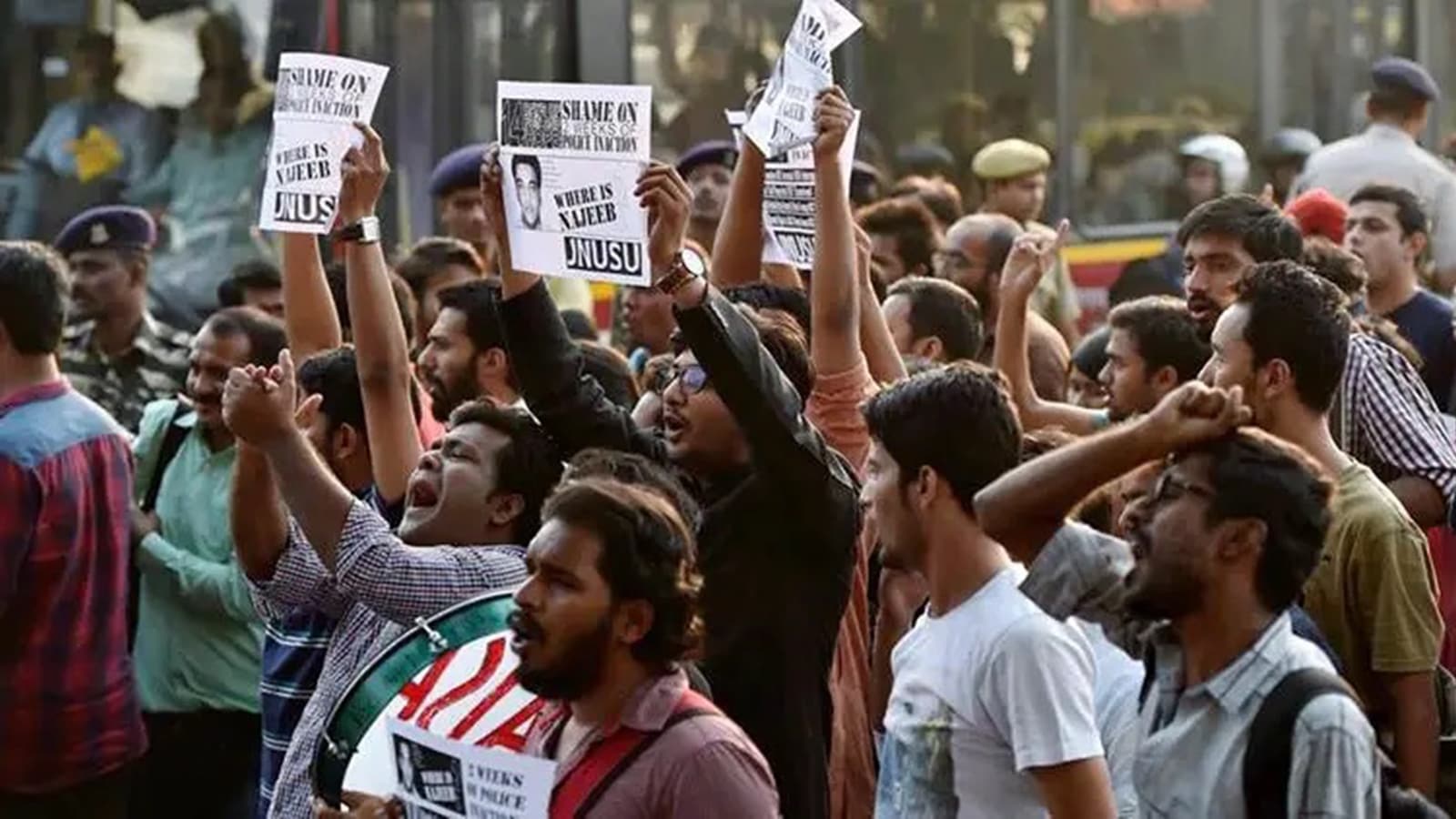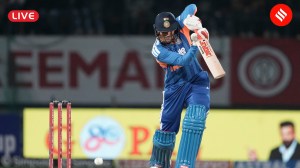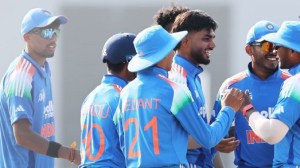JNU’s fault lines move from campus to court: University fights students and faculty
An investigation by The Indian Express has found that since 2011, JNU featured in the Delhi High Court in over 600 cases filed by various stakeholders, including the administration, staff, faculty, students, cleaning personnel, etc., across the tenures of three Vice-Chancellors.
 During the students' union elections at JNU campus in New Delhi on Tuesday. (Express Photo by Abhinav Saha)
During the students' union elections at JNU campus in New Delhi on Tuesday. (Express Photo by Abhinav Saha)For decades, the Jawaharlal Nehru University (JNU) has been at the forefront of the Government’s national rankings, placed at No. 2 over the past two years alone. It has also been the crucible of campus activism, its protests often spilling into national debates, its student leaders going on to become the faces and voices of political parties of all hues and thoughts.
But today, JNU is an institution at the crossroads. One that sues its own, in case after case challenging the campus’s promise of free speech, betraying fraying relationships in the community, between the administration on one side and the faculty and students on the other. Nothing illustrates this better than JNU’s growing mountain of cases.
An investigation by The Indian Express has found that since 2011, JNU featured in the Delhi High Court in over 600 cases filed by various stakeholders, including the administration, staff, faculty, students, cleaning personnel, etc., across the tenures of three Vice-Chancellors.

Of these, this newspaper investigated 205 cases that were decided or disposed of by July this year involving students (158) and faculty (47) — including 118 under the tenure of one Vice-Chancellor alone — which reveal how campus disagreements are increasingly playing out under judicial scrutiny rather than across the table. Consider this:
* During V-C S K Sopory’s tenure (2011-2016), just 37 of such cases reached the Delhi HC — most linked to appointments, PhD submissions, hostel allotments or harassment complaints. Only five challenged wider institutional policy.
* The litigation peaked under V-C M Jagadesh Kumar (2016-2022), when court cases more than tripled compared to his predecessor: 118. These included 92 by students and 26 by faculty members — many tied to protests, disciplinary action and questions of free speech.
* Under current V-C Santishree Dhulipudi Pandit, new cases have fallen, but legal spending by JNU reached Rs 28.4 lakh in 2024-25 alone — the highest annual legal bill in 14 years — largely due to cases inherited from Kumar’s term.
 The JNU Students’ Union takes out a protest in November 2016, alleging inaction on the part of the administration over the disappearance of student Najeeb Ahmed. (File Photo)
The JNU Students’ Union takes out a protest in November 2016, alleging inaction on the part of the administration over the disappearance of student Najeeb Ahmed. (File Photo)
The records also show that students frequently obtained relief from the court.
* Of 92 cases filed by students under Kumar’s tenure, around 40 resulted in relief for them. Under Pandit, at least 19 of 38 cases were decided in the students’ favour with the court repeatedly finding procedural lapses in the university’s disciplinary and appeals processes.
Some of the prominent JNU cases that spilled into the courts during this period included the February 9, 2016 event marking the anniversary of Afzal Guru’s execution in the Parliament attack case; challenges related to the 75% attendance rule; the ‘Occupy Ad-Block’ protests of 2017; and, the unresolved disappearance of student Najeeb Ahmed.
3 V-Cs, 3 legal trails
A breakdown of the 205 cases shows that the lowest number from students and teachers came during Sopory’s tenure (2011–2016). Only five were tied to larger causes, challenging the university’s rules against sexual harassment and academic ordinances. The rest centred on personal grievances: 20 over appointments, salary related issues, thesis submissions, eight related to sexual harassment complaints and four law suits filed by students challenging disciplinary actions.
Sopory told The Indian Express: “We kept an open-door approach. Students could walk in on a designated day. Most issues could be resolved through conversation. They had the right to protest — but classes were not to be disrupted.” He declined to comment on his successors.
During Kumar’s tenure (2016-2022), more than half (49) of the student cases were tied to protests and challenges to university rules. The remainder comprised 31 personal academic grievances, nine challenges to penalties such as suspension and rustication, and three sexual harassment complaints.
Of 26 faculty cases, nine dealt with larger institutional issues — from recruitment policies to the implementation of the National Education Policy 2020 and the reservation roster for SC/ST appointments. The other 17 centred on personal academic disputes such as promotions, tenure, leave denials and administrative decisions affecting governance.
The JNU administration itself also went to court, filing one contempt petition against students — a step not taken under Sopory or Pandit. This petition against the then JNU Students Union President Geeta Kumari and other students for their alleged violation of a 2017 High Court order banning protests within 100 metres of the administrative block. The court fined each student Rs 2,000, even while acknowledging that the respondents were students pursuing higher education.
Kumar did not respond to multiple requests for comment.
Under Pandit (2022-present), JNU has so far faced 50 lawsuits. Of the 38 student cases, five involved disciplinary penalties and 29 concerned personal academic grievances.
Three other lawsuits were tied to larger causes and student protests including a challenge to student union election procedures, a Rs 6,000 fine on a student for writing graffiti on campus walls — a long-standing JNU tradition — and the removal of a student from a hostel for “misconduct” linked to the 2019 fee-hike protests.
Faculty litigation has been more muted under Pandit. Of the 12 cases, nine were personal academic disputes such as promotions, tenure and research-related grievances. One involved sexual harassment, and in two cases, a professor challenged disciplinary action taken against his “misbehaviour” while the other has challenged the Internal Complaints Committee’s (ICC) proceedings.
Pandit did not respond to multiple requests for comment.
When the court stepped in
Delhi High Court orders show that judges cited JNU’s violations of the principle of natural justice while overturning at least 15 cases of disciplinary action against students and directing JNU to conduct fresh hearings with due process – all of them were linked to the Afzal Guru event.
The court found that “the procedure evolved by the Appellate Committee (JNU’s committee that hears appeals against disciplinary action) to allow inspection of the documents/ records and hearing here could not be in conformity with the principles of natural justice and the law laid down by the Supreme Court”.
The bench also held that students were not given adequate time “to enable (them) to supplement their appeals,” which violated the “concept of fair play in action, which is the basis of natural justice”.
It flagged the University’s reliance on anonymous witnesses: “It is not clear who these witnesses are, who are being referred to. All the evidence, documents, notices and proceedings being in the official files, there was no occasion for this court/counsel for the petitioner to look into the same for a proper appreciation/justification of the impugned orders.”
Echoes from outside campus
The Indian Express also spoke to several student leaders and faculty members to place these numbers in context. All of them pointed to a “dramatic transformation” after Kumar took charge in January 2016, the first such appointment under the BJP-led NDA government.
Surajit Mazumdar, president of the JNU Teachers’ Association (JNUTA), said this shift was closely tied to a “specific kind of alignment of government and administration” that emerged in 2016.
“Earlier, decisions flowed from the participation of different stakeholders. That meant fewer grievances, and when problems did arise, there were mechanisms with the internal capacity to address them. Once those democratic structures were dismantled, both the quality of decisions and the capacity for redressal declined,” he said.
N Sai Balaji, who led the Left-aligned students union in 2018-19, said it’s “not about one vice-chancellor or one campus event” but “the regime’s vision”. “In the name of autonomy, they have appointed vice-chancellors who centralise, control and capture democratic spaces to push the ideology of the government in power,” he said.
Vikas Patel, the ABVP’s presidential candidate for the 2025-26 elections, tells a different story — of course correction. “Before 2014, there was a Left monopoly on this campus. Most of the faculty and student politics were Left-oriented. After that, a new generation of students came in… So, it’s not about the BJP being in power, it’s about students making their own choices,” he said.
Echoing this line, a former student leader associated with the ABVP rejected the claim that the university’s autonomy has been affected. “Whenever the Left feels unheard, they go to court, that’s their habit. But the process here is clear. If there’s a mistake, there’s an inquiry, evidence is examined, and then action is taken. It’s not as if the administration acts on its own,” the former student said.
- 01
- 02
- 03
- 04
- 05































